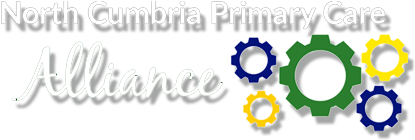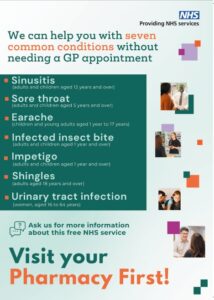From 31st January, patients can pop down to their local pharmacy for help with seven minor conditions which would previously have required a GP appointment.
Almost all pharmacies will offer the new service, giving advice and, if needed, NHS medicines, to treat seven common health conditions – and all without needing to get a GP appointment.
Pharmacists have been backed by Government and the NHS to provide a new NHS ‘Pharmacy First’ service to support people in certain age groups seeking help for sore throats, earache in children, sinusitis, infected insect bites, impetigo, shingles, and urinary tract infections in women.
If you have symptoms that suggest you may have one of these conditions, you can now walk into a pharmacy and be offered a consultation with the pharmacist. Under the new service pharmacists can provide advice and, if clinically necessary, will offer an NHS medicine to treat it (NHS prescription charge apply if you normally pay for medicines supplied on prescription). Should the pharmacy team be unable to help, you will be directed to your GP surgery or A&E as appropriate.
By thinking ‘Pharmacy First’, people will find it easier and quicker to get the help they need and bypass the 8am rush to book an appointment with their GP.
Find the new service at a pharmacy near you using the NHS website: https://www.nhs.uk/nhs…/prescriptions-and-pharmacies/
About the service
The Pharmacy First service enables members of the public to visit pharmacies, as a first port of call, for help with a range of common minor conditions.
The service enables pharmacists to offer advice to patients and supply NHS medicines (including antibiotics), where clinically appropriate, for:
1. Sinusitis – for children and adults aged 12 years and over;
2. Sore throat – for children and adults aged 5 years and over;
3. Earache (Acute otitis media) – for children aged 1 to 17 years;
4. Infected insect bite – for children and adults aged 1 year and over;
5. Impetigo – for children and adults aged 1 year and over;
6. Shingles – for adults aged 18 years and over; and
7. Uncomplicated urinary tract infections in women aged 16 to 64 years.


